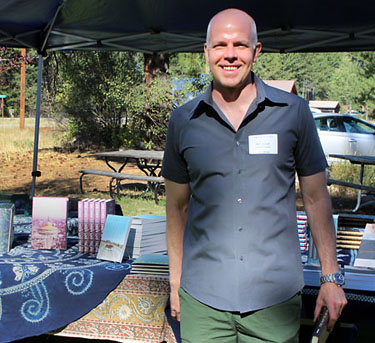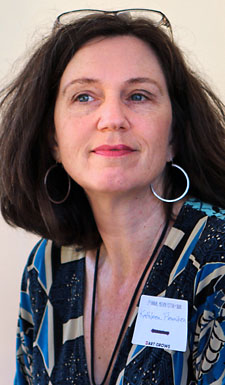home | internet service | web design | business directory | bulletin board | advertise | events calendar | contact | weather | cams

 Art Gresh, founder of the Mazama Festival of Books, divides his time between Mazama and New York. Art Gresh, founder of the Mazama Festival of Books, divides his time between Mazama and New York.
Words Under the Wall The first annual Mazama Festival of Books was launched Saturday morning when Washington State Poet Laureate Kathleen Flenniken and New York publicist Lauren Cerand inaugurated the two-day event with a discussion of the art of poetry. About 50 people gathered in an open, two-walled tent in a field adjoining the Mazama Community Club.  Washington State Poet Laureate Kathleen Flenniken is a civil engineer who grew up in Richland and worked at at the Hanford nuclear complex.. Washington State Poet Laureate Kathleen Flenniken is a civil engineer who grew up in Richland and worked at at the Hanford nuclear complex..Flenniken grew up in Richland and became a civil engineer who worked at the Hanford nuclear reservation, which during World War II produced the bombs that were dropped on Hiroshima and Nagasaki. She first discovered poetry at age 32, after taking a night class in the subject. “I just fell in love with it,” she told the audience. At first she didn’t disclose her poetic leanings to her work colleagues, she said. “It was my dirty secret.” But finally, she added, “It was so much of who I was I had to come out.” 8/19/2012 Comments This was an outstanding event! Through lively discussions with the interviewers (Lauren and Kathryn) and the audience, the author's lives and writing lives came to life. Anyone who enjoys reading fiction, poetry, memoir, YA, picture books, nonfiction should attend this event next time it is held. A great weekend with a remarkable gathering of writers and readers. Thank you Art, Lisa, Lauren, Kathryn, Methow Arts, Trails End Bookstore, and everyone else who helped to create this event. Linda M Robertson Winthrop Best event I've been to this summer. Great to see our local authors Eric Brooks and Danbert Nobacon included and they delivered as much as all the other authors. Particularly enjoyed the connection between music and writing. Don't miss this event next year. Joseph Weaver Winthrop
|